
Parc (French) or Park (Dutch) is a Brussels Metro station on lines 1 and 5. It is located under Brussels Park in central Brussels, Belgium. It has one entrance, at the intersection of the Rue Royale/Koningsstraat and the Rue de la Loi/Wetstraat, two of the main roads of the City of Brussels.

Arts-Loi (French) or Kunst-Wet (Dutch) is a Brussels Metro station on lines 1, 2, 5 and 6. It is located in the City of Brussels, Belgium, under the intersection of the Rue de la Loi/Wetstraat and the Avenue des Arts/Kunstlaan, after which it is named, the latter street being part of the Small Ring.

Heysel (French) or Heizel (Dutch) is a Brussels Metro station on the northern branch of line 6. It is located in Laeken, in the north-west of the City of Brussels, Belgium, and serves the Heysel/Heizel Plateau, famous for the World's Fairs of 1935 and 1958, the King Baudouin Stadium and the Atomium. The Bruparck entertainment park and the Centenary Palace, home to the Brussels Exhibition Centre, are also located nearby.

King Baudouin is a Brussels Metro station serving as the northern terminus of line 6. It is located in Laeken, in the north-west of the City of Brussels, Belgium, and serves the King Baudouin Stadium.

Jacques Brel is a Brussels Metro station on the western branch of line 5. It is located in the municipality of Anderlecht, in the western part of Brussels, Belgium. The station is named after the Belgian singer, songwriter, and poet Jacques Brel.

Houba-Brugmann is a Brussels Metro station on the northern branch of line 6. It is located under the Avenue Houba De Strooper/Houba De Strooperlaan, near Brugmann University Hospital, in Laeken, in the north-west of the City of Brussels, Belgium. The station is jointly named after the city official Louis Houba and the 19th-century philanthropist Georges Brugmann.

Stuyvenbergh is a Brussels Metro station on the northern branch of line 6. It is located under the intersection of the Avenue Houba De Strooper/Houba De Strooperlaan, the Avenue Émile Bockstael/Émile Bockstaellaan and the Avenue De Smet De Naeyer/De Smet De Naeyerlaan, in Laeken, in the north-west of the City of Brussels, Belgium. The station takes its name from the Château of Stuyvenberg, which is just to the east, in Laeken Park.
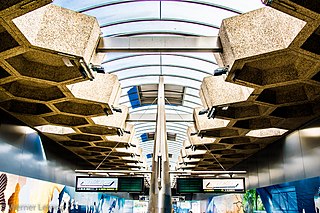
Belgica is a Brussels Metro station on the northern branch of line 6. It is located in the municipality of Jette, in the north-west of Brussels, Belgium. The station received its name from the aboveground Boulevard Belgica/Belgicalaan, itself named in honour of RV Belgica, the ship that carried the first Belgian polar expedition to the Antarctic in 1897.

Beekkant is a Brussels Metro station on lines 1, 2, 5 and 6. It is located under the Boulevard Edmond Machtens/Edmond Machtenslaan in the municipality of Molenbeek-Saint-Jean, in the western part of Brussels, Belgium. The station's name translates into English as "Brookside".
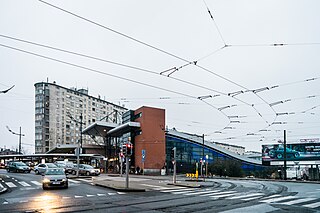
Brussels-West Station is a multimodal transport hub located in the municipality of Molenbeek-Saint-Jean, in the western part of Brussels, Belgium. It mainly consists of Gare de l'Ouest (French) or Weststation (Dutch), a Brussels Metro station on lines 1, 2, 5 and 6, as well as a tram and bus stop. Additionally, Brussels-West railway station is a railway station operated by the National Railway Company of Belgium (SNCB/NMBS). It is served by the Brussels Regional Express Network (RER/GEN) service.

Étangs Noirs (French) or Zwarte Vijvers (Dutch) is a Brussels Metro station on lines 1 and 5. It is located at the border between the municipalities of Koekelberg and Molenbeek-Saint-Jean, in the western part of Brussels, Belgium. The station's name translates into English as "Black Ponds".
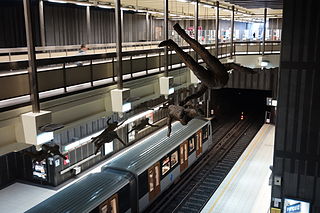
Comte de Flandre (French) or Graaf van Vlaanderen (Dutch) is a Brussels Metro station on lines 1 and 5. It is located in the municipality of Molenbeek-Saint-Jean, in the western part of Brussels, Belgium. The station takes its name from the nearby street Rue du Comte de Flandre/Graaf van Vlaanderenstraat.
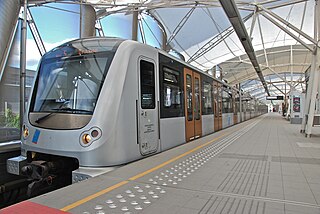
Erasme (French) or Erasmus (Dutch) is a Brussels Metro station serving as the western terminus of line 5. It is located in the municipality of Anderlecht, in the western part of Brussels, Belgium. The station was designed by Philippe Samyn and Partners and is named after Erasmus Hospital, which it serves. It lies at grade and has a single island platform, which can be reached through tunnels under the tracks.

CERIA (French) or COOVI (Dutch) is a Brussels Metro station on the western branch of line 5. It is located in the municipality of Anderlecht, in the western part of Brussels, Belgium. The station serves the Food and Chemical Industries Education and Research Center (CERIA/COOVI), after which it is named, and is also the closest metro station to the IKEA Anderlecht store.
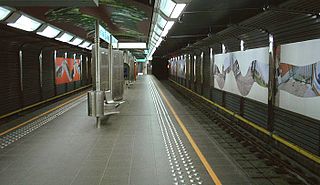
La Roue (French) or Het Rad (Dutch) is a Brussels Metro station on the western branch of line 5. It is located in the municipality of Anderlecht, in the western part of Brussels, Belgium. The station serves the La Roue/Het Rad district, after which it is named.

Aumale is a Brussels Metro station on the western branch of line 5. It is located in the municipality of Anderlecht, in the western part of Brussels, Belgium. The station received its name from the aboveground street Rue d'Aumale/Aumalestraat.
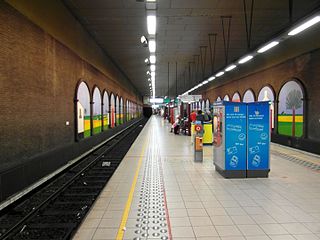
Clemenceau is a Brussels Metro station on the southern segment of lines 2 and 6. It is located under the Rue Jorez/Jorezstraat, close to the Avenue Clemenceau/Clemenceaulaan, in the municipality of Anderlecht, in the western part of Brussels, Belgium. The station takes its name from that nearby avenue, itself named after Georges Clemenceau, a former Prime Minister of France.

Delacroix is a Brussels Metro station on lines 2 and 6. It is located in the municipality of Anderlecht, in the western part of Brussels, Belgium. It is an elevated station, running parallel to the Rue Léon Delacroix/Léon Delacroixstraat, and forming a bridge-viaduct over the Brussels–Charleroi Canal, with entries and exits leading to and from both banks of the canal. The station takes its name from that nearby street, itself named after Léon Delacroix, Belgium's 22nd Prime Minister.

Botanique (French) or Kruidtuin (Dutch) is a Brussels Metro station on the northern segment of lines 2 and 6. It is located under the Small Ring at the Rue Royale/Koningsstraat in the municipality of the Saint-Josse-ten-Noode, north of the City of Brussels, Belgium.
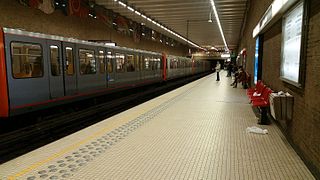
Ribaucourt is a Brussels Metro station on the northern segment of lines 2 and 6. It is located under the Boulevard Léopold II/Leopold II-laan in the municipality of Molenbeek-Saint-Jean, in the western part of Brussels, Belgium. The station takes its name from the Belgian noble family De Ribaucourt, as well as De Ribaucourt park and castle.




















